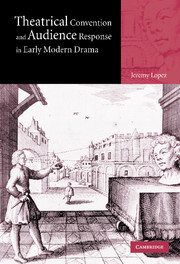Book contents
- Frontmatter
- Contents
- Acknowledgments
- Introduction
- PART I
- 1 “As it was acted to great applause”: Elizabethan and Jacobean audiences and the physicality of response
- 2 Meat, magic, and metamorphosis: on puns and wordplay
- 3 Managing the aside
- 4 Exposition, redundancy, action
- 5 Disorder and convention
- PART II
- Plays and editions cited
- Works cited
- Index
2 - Meat, magic, and metamorphosis: on puns and wordplay
Published online by Cambridge University Press: 22 September 2009
- Frontmatter
- Contents
- Acknowledgments
- Introduction
- PART I
- 1 “As it was acted to great applause”: Elizabethan and Jacobean audiences and the physicality of response
- 2 Meat, magic, and metamorphosis: on puns and wordplay
- 3 Managing the aside
- 4 Exposition, redundancy, action
- 5 Disorder and convention
- PART II
- Plays and editions cited
- Works cited
- Index
Summary
A huge, bare, outdoor stage, like the Globe, or a smaller, bare, indoor stage on which audience members were allowed to sit, like the Blackfriars, would have required an actor to be acutely aware of space: of the physical space between actor and audience, and of the more metaphorical theatrical space within which the sense of an illusion would have to be developed. The silence must indeed have been deafening to an actor speaking a soliloquy in Webster's White Devil before a sparse crowd in the “open and black” Red Bull theatre, especially if the “auditory” was not a sympathetic one; and the antics of a gallant like the one described by Jonson in The Devil is an Ass could certainly be expected to rival the events on the stage, occurring as they would have been at the front of it. Whether too close to or far from the stage, the spectators' very visibility made quite definite demands on both the physical and metaphorical space of the theatre: a constant sense both of illusion and of awareness of illusion as illusion had to be maintained. Extravagant, stylized, often bloody spectacle was one way of meeting these demands, and it will be discussed at further length in chapter 5. First, however, I want to look at the smaller, verbal equivalents of such spectacle – the linguistic habits or tics for which Renaissance drama is so well known and which have become virtually dismissible as “conventions.”
- Type
- Chapter
- Information
- Publisher: Cambridge University PressPrint publication year: 2002



